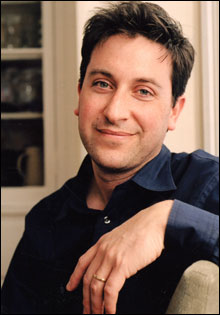
SURVIVOR: From his brother’s words, Ken Dornstein assembles his own story.
|
The myth of Icarus is central to Ken Dornstein’s memoir. How many people have meditated on that image to describe falls both factual and metaphorical? The trope is ancient and instantly resonant. Dornstein evokes it first to describe his brother’s death in the bombing of Pan Am Flight 103 over Lockerbie, a six-mile plunge from cruising altitude to earth. Then he makes slow circles around his metaphor to include descents of every kind — the toppling of a hero off his pedestal, the fall from grace, the giving in to temptation, the plummet into madness.
He begins the story of his brother David as if it were a fable. “Once upon a time, I had a brother. He was older, bigger, wiser, more daring, more passionate, better spoken, and much better looking.” David’s great ambition was to be a writer. He filled reams of paper and many notebooks with words, and he bombarded friends and family, particularly Ken, with extravagant letters. His writings are grandiose, hyper, lyrical, ridiculous, and beautiful. But the words never cohered into the work of genius that David, and everyone else, was sure he had in him. Instead they became a kind of chronicle of David’s fantasized achievements.
“We see many of the characteristics of Dornstein’s later work emerging in these youthful journals. . . . We see a young artist goading himself to flower, aching away in flimsy whimsy,” David wrote in anticipation of his triumph, a conjured future where scholars would marvel over his work. Intermittently he would crash from his manic magniloquence into inconsolable self-loathing. “Your life is not the biography of your life that you imagine,” he berates himself in one notebook. “Maybe I’m not a natural Artist . . . I’m too pretentious . . . The trouble is that once I sort through all of the bullshit, I find I’ve got nothing left to say.”
David’s seeming prescience about his fate is downright eerie. Ken places instances of it strategically throughout the text. He describes David in the prestigious writing program at Brown University deciding on a form for his opus, a “fictional autobiography.” The story: “An unknown young writer dies in a plane crash leaving behind lots of notebooks and bits of stories.” David’s summary: “Born, lives, dies, entirely through words, I am the book, the book is me.” He calls his work The Fall Journal.
ADVERTISEMENT
 |
Shortly before embarking for the US from Israel, where he was living with his girlfriend, David took a day trip to the supposed site of the Garden of Eden. Moved by the spot’s natural beauty, he sat down under a tree and wrote a letter to the family he expected to see soon. “Dear Family, I have walked through the Gates of Heaven and have entered Paradise.” The letter arrived two weeks after his death.
Ken Dornstein remembers staring at the envelope “as if it were a message from the hereafter. . . . Who wouldn’t want to receive a letter from a dead relative reporting a safe-and-sound arrival in Heaven?”
After David died, Ken was left with an archive of fragments. He began a long, careful process of piecing together that resulted in this chiseled documentary. Along the way he finds a kind of satisfaction that David’s dysfunction never permitted him. He becomes the writer his brother couldn’t. (He’s now series editor at PBS’s Frontline.) And in a slightly uncomfortable turn of events, he falls in love with and marries David’s college sweetheart.
If all of this seems alarmingly vulnerable to Freudian interpretation, don’t think that Dornstein isn’t aware of that. His memoir is an elegy, a love letter, but also a necessarily mechanistic performance of what Freud called “the work of grief” — “the only way of perpetuating that love which we do not want to relinquish.”
THE BOY WHO FELL OUT OF THE SKY | BY KEN DORNSTEIN | RANDOM HOUSE | 320 PAGES | $23.95